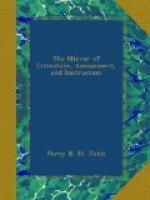In 1771, when Parr was in his twenty-fifth year, Dr. Sumner was suddenly carried off by apoplexy. Parr now became a candidate for the head mastership of Harrow, founding his claims on being born in the town, educated at the school, and for some years one of the assistants. The governors, however, preferred Dr. Benjamin Heath, an antagonist by whom it was no disgrace to be beaten, and whose personal merit Parr himself allowed to justify their choice. A rebellion among the boys, many of whom took Parr’s part, ensued; and in an evil hour he threw up his situation of assistant, and withdrew to Stanmore, a village a very few miles from Harrow. Here he was followed by forty of the young rebels, and with this stock in trade he proceeded to set up a school on his own account. This, Dr. Johnstone thinks, was the crisis of Parr’s life. The die had turned up against him, and the disappointment, with its immediate consequences, gave a complexion to his future fortunes, character, and comfort. He had already mounted a full-bottomed wig when he stood for Harrow, anxious, as it should seem, to give his face a still further chance of keeping its start. He now began to ride on a black saddle, and bore in his hand a long wand with an ivory head, like a crosier in high prelatical pomp. His neighbours, who wondered what it could all mean, had scarcely time to identify him with his pontificals, before they saw him stalking along the street in a dirty, striped dressing-gown. A wife was all that was now wanted to complete the establishment at Stanmore, and accordingly Miss Jane Marsingale, a lady of an ancient Yorkshire family, was provided for him, (Parr, like Hooker, appears to have courted by proxy, and with about the same success,) and so Stanmore was set a going as the rival of Harrow. These were fearful odds, and it came to pass, that in spite of “Attic symposia,” and groves of Academus, and the enacting of a Greek play, and the perpetual recitation of the fragment in praise of Harmodius and Aristogeiton, the establishment at Stanmore declined, and at the end of five years, Parr was not sorry to accept the mastership of an endowed school at Colchester. To Colchester, therefore, he removed with his wife and a daughter in the spring of 1777. Here he took priest’s orders at the hands of Bishop Lowth, and found society congenial to him in Dr. Foster, a kindred whig, and in Thomas Twining, a kindred scholar.




